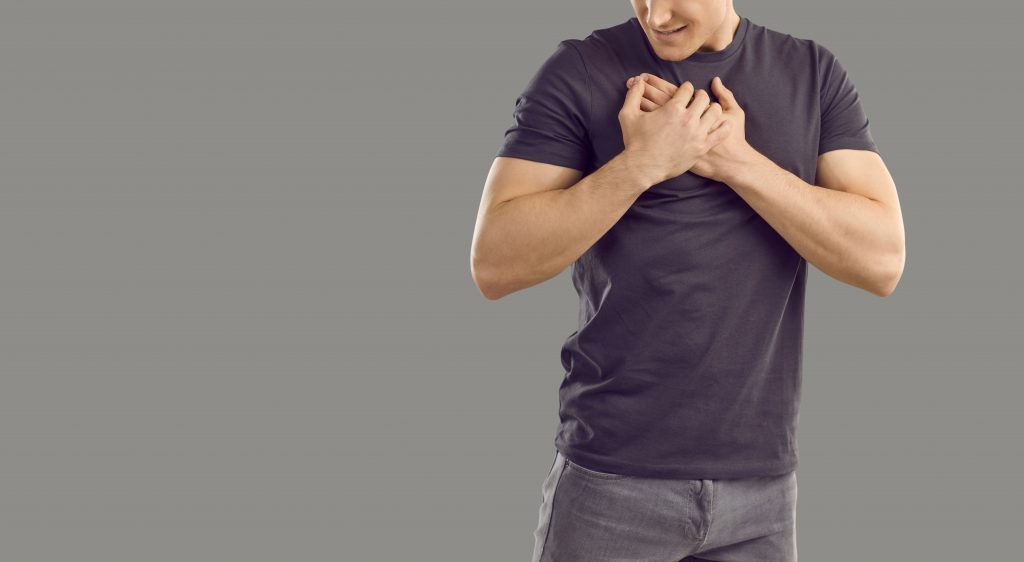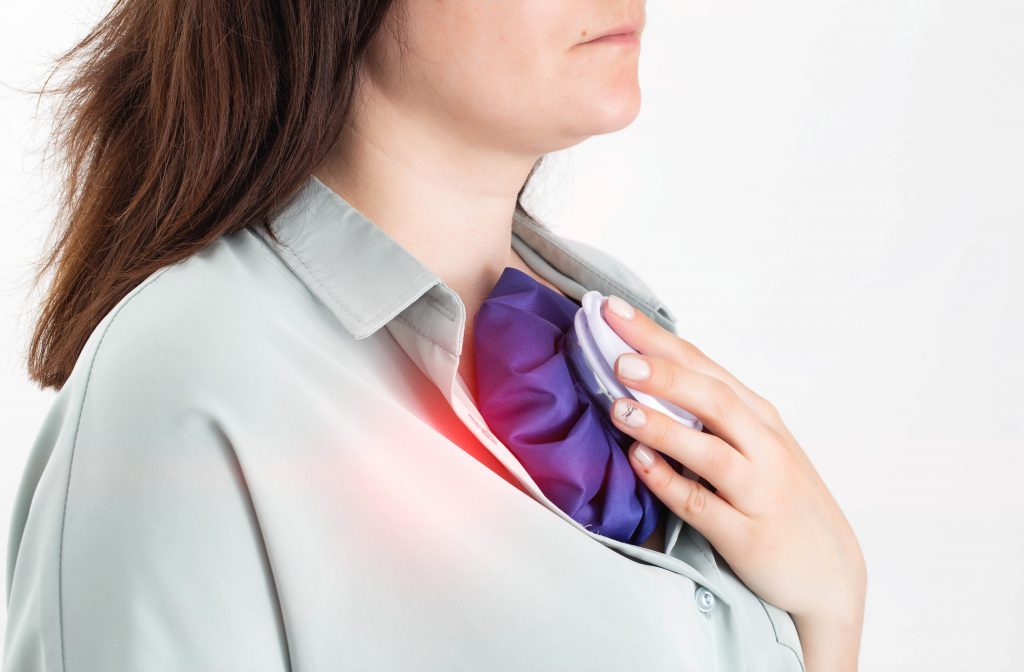July 1, 2022
Strained Chest Muscle: Causes, Symptoms, and Treatment
A strained chest muscle can often cause extreme chest discomfort and pain, making it difficult to perform and enjoy your daily activities. Here’s more about the causes and symptoms of muscle strain in the chest and how to contact Healthcare Associates of Texas when you’re ready for a proper diagnosis and treatment.
What Is a Strained Chest Muscle?
A strained chest muscle occurs when you tear or stretch a muscle in your chest. This is also known as a pulled muscle or muscle strain, or more specifically, an intercostal muscle strain.
When a chest muscle becomes strained, it can cause a sudden, sharp pain that radiates throughout the chest area. Fortunately, a strained chest muscle is usually only a minor injury that heals within a few days or weeks.
What Causes a Strained Chest Muscle?
Your chest muscle can become strained when you lift a heavy object or get injured while playing contact sports like football. Potential causes of a strained chest muscle include:
- Repetitive and/or forceful movements that involve the chest muscle, such as swinging a tennis racket

- Overstretching
- Muscle fatigue
- Contact injuries or a blow to the chest, such as that from an auto accident or contact sports
- Poor flexibility
- Poor posture
- Heavy lifting
- Twisting your body while lifting
- Skipping warm-ups before exercising or playing sports
- Reaching overhead for extended periods
- Falling
- Coughing severely
Anyone can develop a strained chest muscle. However, certain people may be at higher risk, such as older adults who fall frequently. Adults who play contact sports like soccer or are in auto accidents are also often at increased risk for a strained chest muscle.
What Are Symptoms of a Strained Chest Muscle?
A strained chest muscle usually causes pain in the chest that gets worse when you move or cough. Common pulled chest muscle symptoms include:
- Pain in the chest that may be sharp or dull
- Pain in the chest that gets worse when you move your chest or upper spine
- Difficulty moving the chest or affected area
- Pain in the chest that gets worse when you sneeze, cough, or breathe
- Swelling of the chest
- Bruising on the chest
- Muscle spasms
- Soreness or a tender sensation inside the chest wall
- Upper back pain
Chest pain is also a symptom of several other serious health conditions that require immediate medical attention. Heart attack, pulmonary embolism, and pneumonia are some of the many health problems that can cause chest pain. See your doctor right away if you are experiencing any type of chest pain so you can receive a proper diagnosis and treatment.
What Are the Different Grades of a Strained Chest Muscle?
If you are diagnosed with a strained chest muscle, your doctor will assign it a grade based on the severity of your injury.
 A Grade 1 injury refers to mild damage to the chest that affects less than 5% of its individual muscle fibers. Your strength and motion may be mildly affected, and recovery usually only lasts between two and three weeks.
A Grade 1 injury refers to mild damage to the chest that affects less than 5% of its individual muscle fibers. Your strength and motion may be mildly affected, and recovery usually only lasts between two and three weeks.
A Grade 2 injury indicates more extensive damage to the chest that affects a higher amount of muscle fibers without completely rupturing the muscle. You may experience significant problems with strength and motion. Grade 2 injuries usually take between two and three months to heal.
A Grade 3 injury is a complete rupture of the chest muscle. In severe cases, you may need surgery to repair or reattach the affected muscle.
What Are the Best Ways to Treat a Strained Chest Muscle?
Treatment for a strained chest muscle will usually depend on its severity or grade. Common treatments include:
RICE
“RICE” stands for rest, ice, compression, and elevation. Your doctor may recommend treating your chest with RICE for the first two days following your injury.
Rest involves taking it easy and avoiding strenuous activities—especially those that cause you to pull your chest muscle. Ice involves wrapping ice in a towel and applying it to the injured part of your chest for 20 minutes at a time. Compression involves wrapping a compression bandage around your torso to reduce swelling and prevent further injury. Elevation involves raising the injured body part above the level of your heart, which could mean sleeping in a recliner or using extra pillows.
Medications
Any chest pain you feel can usually be managed using acetaminophen or nonsteroidal anti-inflammatory drugs (NSAIDs) like ibuprofen or high-dose aspirin. If your chest pain persists or is highly severe, your doctor may even prescribe opioids or muscle relaxants.
Rehabilitation
Rehabilitation involves doing certain exercises and movements that can restore your strength and flexibility, and help you maintain muscle function. Your doctor may show you certain exercises and develop a customized exercise plan. In some cases, your doctor may even refer you to a physical therapist or occupational therapist who provides these services.
Surgery
Surgery is typically only performed on Grade 3 muscle strains that are completely torn. Treatment usually involves making an incision on your chest and reattaching the affected tendon to the bone.
How To Speed Up Muscle Strain Recovery
Your doctor may give you a list of specific instructions regarding how to care for yourself after getting a strained chest muscle. For instance, you may be asked to avoid heavy lifting and other strenuous activities until you are fully healed.
Other steps you can take to speed up muscle strain recovery include:
- Staying hydrated and drinking plenty of water to help your muscles heal
- Getting plenty of rest and sleep
- Practicing RICE along with any other treatments
- Doing low-impact exercises that won’t worsen the injury
- Eating a higher amount of protein to promote muscle recovery
- Limiting your alcohol intake and tobacco use
- Avoiding sugary foods that contribute to inflammation
Treating a Strained Chest Muscle with Healthcare Associates of Texas
Visit our website today to request an appointment if you need treatment for a strained chest muscle. Our board-certified physicians and healthcare specialists can properly diagnose your condition and help you choose the best treatment so you can get back to your usual activities as quickly as possible.
DISCLAIMER
The information featured in this site is general in nature. The site provides health information designed to complement your personal health management. It does not provide medical advice or health services and is not meant to replace professional advice or imply coverage of specific clinical services or products. The inclusion of links to other web sites does not imply any endorsement of the material on such websites.